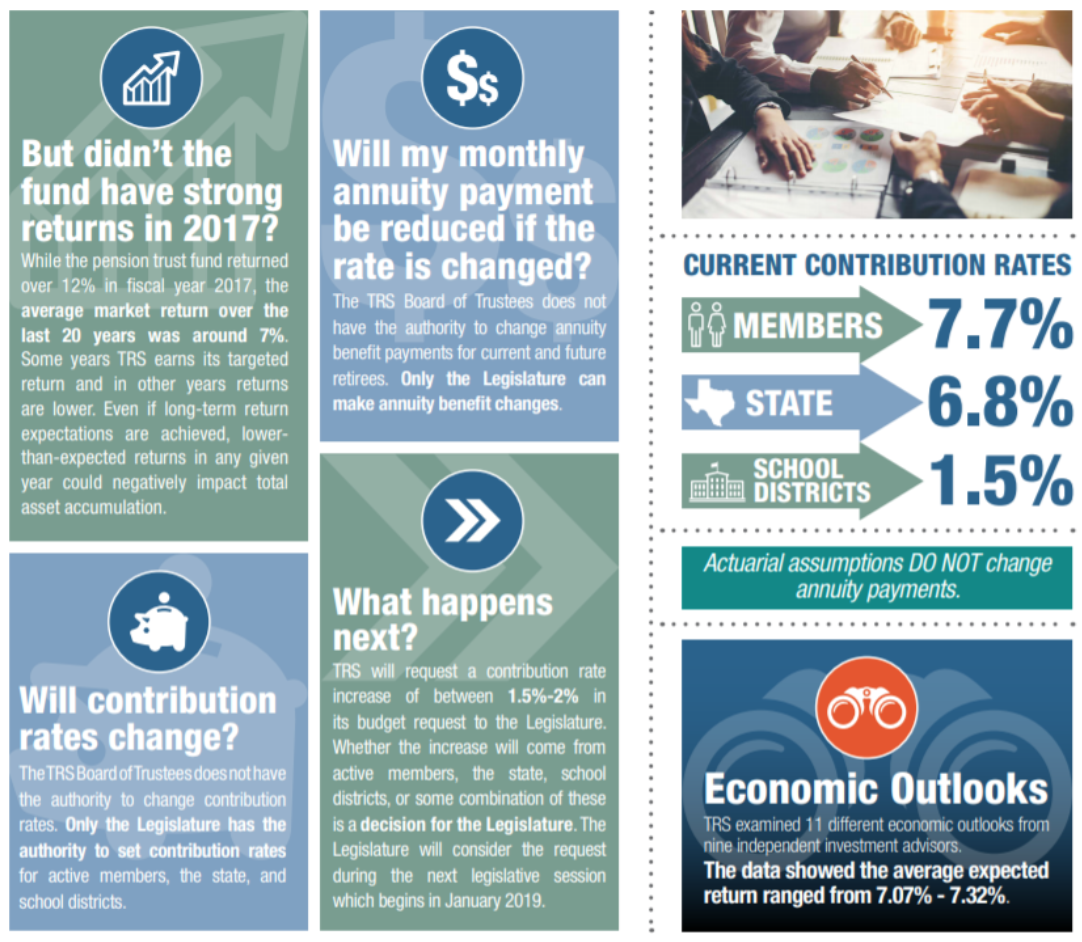|
A recent Wall Street Journal article highlighted how the $4 trillion in total unfunded public pension debts of cities and states nationwide equals Germany’s economy. The WSJ figure below highlights how this massive sea of red ink means that there could be a tremendous burden on taxpayers as contributions rise or on public sector employees’ as funded ratios decline without major reforms.
In other words, public sector employees and taxpayers may soon be in a world of hurt because of decades of poorly managed and constructed defined-benefit pension plans. The Teacher Retirement System of Texas, or TRS, recently lowered its assumed rate of return for its pension fund from 8 percent to 7.25 percent. The TRS figure below shows that the lower rate is more consistent with the average annual returns in the past 20 years of around 7 percent, but it remains well above the 5.8 percent average return in the last decade. While some Texas teachers and unions worry about potential benefit cuts, teachers shouldn’t fret about changes to current benefits from the lowered assumed rate of return but rather note that the increased transparency helps better reflect longer-term solvency issues. The lowered return indicates unfunded liabilities amount to a staggering $45 billion, pushing the funded ratio below 80 percent, which that some consider actuarially sound. However, if the funded ratio is below 100 percent, then some teachers are at risk of not receiving their retirement because of insufficient funds to pay them. The goal of public pensions should always be a 100 percent funded ratio so teachers and taxpayers aren’t shortchanged. To better fund teachers’ pensions, TRS has stated they will request more contributions from the Texas Legislature this upcoming session. These added contributions could come from current teachers or taxpayers through increased state or school district spending, but that’s up to legislators. While Texas has historically had terrific credit ratings, it risks a downgrade if the Legislature doesn’t solve what could be a looming pension crisis. Total state unfunded pension liabilities now amount to more than $60 billion after the recent TRS decision. These unfunded liabilities, if not covered, will require more resources from teachers and taxpayers. Lowering the rate of return to a more accurate assumption is a step in the right direction, but more reform is necessary. To assure a 100 percent funded ratio, the Legislature should consider transitioning pension plans to cash balance plans. Or, to avoid getting back into the current situation from mismanagement of the portfolio over time, legislators should consider hybrid contribution plans or defined contribution, 401K-style, plans. Traditional opponents of defined contribution plans say they cost more to the state, are less stable for retirees, and generate less returns over time. However, most of these are unfounded and those that are legitimate have solutions. A well-designed defined contribution plan can be even more beneficial to teachers so that they are in control of their retirement while practically eliminating the risk to taxpayers. The looming debt crisis could hurt teachers and taxpayers if the can is continually kicked down the road. Before the can makes it off the cliff, legislators should act and reform the system. www.texaspolicy.com/blog/detail/teachers-pension-crisis-in-texas
0 Comments
Leave a Reply. |
Vance Ginn, Ph.D.
|


 RSS Feed
RSS Feed